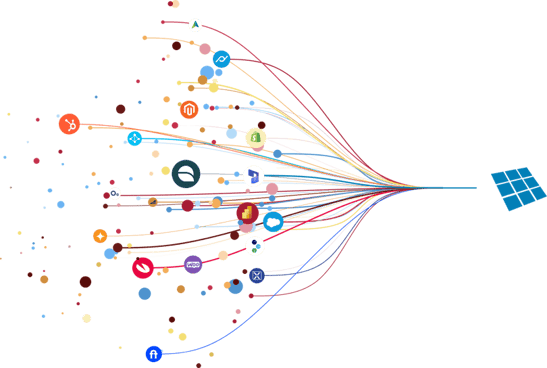Moving on-prem ERP to cloud can be a seamless process
.webp?width=787&height=440&name=reshot-illustration-cloud-connections-VBTHSA6EM5%20(1).webp)
One of the biggest challenges that businesses face when moving from an on-premise ERP solution to a cloud-based ERP solution is what to do with their existing integrations. Many businesses have integrated their on-premise ERP solutions with other systems and applications, such as CRM, e-commerce, payroll, and other vital Enterprise Business Capability (EBC) solutions.
Enterprise resource planning (ERP) software is a vital tool for many businesses, as it helps them manage their core processes, such as accounting, inventory, production, sales, and human resources. However, many businesses still rely on outdated and inefficient on-premise ERP solutions, which can limit their growth, productivity, and profitability.
On-premise ERP solutions are installed and maintained on the company’s own servers, which means they require a lot of upfront investment, hardware, software, and IT staff. They also pose several challenges for businesses, such as high maintenance and upgrade costs, limited scalability and flexibility, poor accessibility and mobility, security and compliance risks, and integration and compatibility issues. These challenges can prevent businesses from adapting to changing market conditions, customer demands, and technological innovations. That’s why many businesses are considering moving their ERP solutions to the cloud.
Benefits
Cloud ERP solutions are hosted and managed by a third-party provider, which means they do not require any hardware, software, or IT staff on the company’s premises. They also offer several benefits for businesses - By moving their ERP solutions to the cloud, businesses can:
- Reduce their total cost of ownership, as they only pay for what they use and do not have to worry about maintenance and upgrade costs
- Scale up or down their resources quickly and easily, as they can access the cloud provider’s infrastructure and services on demand
- Access their data and applications from anywhere and any device, as they are available online and through mobile apps
- Improve their security and compliance, as they can rely on the cloud provider’s expertise and standards to protect their data and applications from unauthorized access, loss, or damage
- Integrate their ERP solutions with other cloud-based applications and services, as they can use the cloud provider’s APIs and connectors to create seamless data flows and business processes
These benefits can help businesses improve their efficiency, agility, and competitiveness in the digital era. They can also enable businesses to leverage the latest technologies, such as artificial intelligence, machine learning, and big data analytics, to gain valuable insights and optimize their performance.
Challenges
However, moving from an on-premise ERP solution to a cloud-based ERP solution is not a simple or straightforward process. It requires careful planning, preparation, and execution. It also involves several challenges, such as choosing the right cloud provider and ERP solution, migrating the data and applications to the cloud, training the users and staff on the new system, managing the change and transition, and ensuring the quality and performance of the system.
One of the biggest challenges that businesses face when moving from an on-premise ERP solution to a cloud-based ERP solution is what to do with their existing integrations. Many businesses have integrated their on-premise ERP solutions with other systems and applications, such as CRM, e-commerce, payroll, and email. These integrations are essential for their business operations, but they may not be compatible with the cloud ERP solutions.
Solution- iPaaS
That’s why businesses need a reliable and robust integration platform as a service (IPaaS) solution that can help them migrate their existing integrations to the cloud and create new ones. IPaaS is a cloud-based platform that enables users to connect, manage, and orchestrate data and applications across different systems and environments.
One such IPaaS solution available in the market is of course ConnectMyApps Canvas, a powerful and user-friendly IPaaS solution that can help businesses migrate their existing integrations to the cloud and create new ones. Canvas can help businesses connect their cloud ERP solutions with other cloud-based or on-premises systems and applications, automate their data flows and business processes, monitor and troubleshoot their integrations, optimize their integrations for performance and scalability, and customize their integrations for specific needs and preferences.
The iPaas platform, Canvas
Canvas can also help businesses reduce the time, cost, and complexity of moving from an on-premise ERP solution to a cloud-based ERP solution. With Canvas, businesses can:
- Migrate their existing integrations to the cloud in minutes, as Canvas can automatically detect and convert their on-premise integrations to cloud-based ones
- Use pre-built connectors and templates for common integrations, as Canvas has a library of ready-made integrations for popular systems and applications, such as Salesforce, Visma, Hubspot, and a host of others
- Build new integrations with drag-and-drop tools and visual interfaces, as Canvas has a user-friendly design studio that allows users to create integrations without coding
- Test and validate their integrations before deploying them, as Canvas has a sandbox environment that allows users to run and debug their integrations in a safe and isolated manner
- Manage and update their integrations with ease and flexibility, as Canvas has a dashboard that allows users to monitor and control their integrations from a single place
If you are interested in learning more about Canvas and how it can help you move your ERP to the cloud, please visit connectmyapps.com or contact us for a free consultation.



